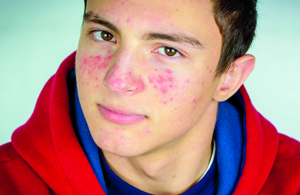Teen acne: What you need to know
9/16/2025 by Sheri Pariha, M.B.B.S.

What Is Acne?
Pimples, or acne, are a common skin condition that happens when pores become clogged with oil (called sebum) and dead skin cells. Cutibacterium acnes, which naturally lives on your skin, can multiply in the extra oil and lead to inflammation.
During puberty, hormones cause more sebum production, increasing the likelihood of pores clogging.
Surface-level clogs cause less inflammation and lead to whiteheads (closed comedones) or blackheads (open comedones). Deeper clogs can lead to more inflammation and result in pimples, red bumps, nodules or cysts.
Caring for acne-prone skin
- Be gentle. Washing too often or using harsh products can dry out your skin and damage its natural barrier, making acne worse. Wash your skin twice daily and after sports or vigorous activity that makes you sweat.
- Choose non-comedogenic (non-pore-clogging), oil-free, water-based skin care and cosmetic products.
- Don’t pick or pop pimples. It can lead to scarring and more inflammation.
- Consistency is key. Stick with a routine for several weeks to see improvement.
Does diet cause acne?
There’s no strong evidence that specific foods cause acne, but a balanced diet helps your skin overall. If you notice certain foods seem to trigger breakouts, it’s OK to cut back on them.
Does stress make acne worse?
While stress doesn’t cause acne, it is linked to more severe acne — especially during busy times like school exams or life changes. Being physically active, getting enough sleep and connecting with supportive friends and family can help lower stress.
Over-the-counter treatments
You can try over-the-counter (non-prescription) acne treatments available at most pharmacies.
- Benzoyl Peroxide (2% to 10%) once or twice daily: This comes in many forms (e.g., cleansers, gels, lotions, creams, pads, masks, washes) and kills acne-causing bacteria and reduces inflammation.
- Salicylic Acid (2% to 5%): Unclogs pores by exfoliating dead skin.
- Adapalene Gel (0.1%) once daily at night after washing with a gentle cleanser: A topical retinoid that helps prevent clogged pores and improves skin turnover.
How to use these products
Avoid using adapalene and benzoyl peroxide/salicylic acid at the same time, as this reduces the effectiveness of adapalene. If using both, you may try Benzoyl peroxide or salicylic acid in the morning and Adapalene in the evening.
Mild irritation and dryness are common when first using these products. If you are known to have sensitive skin, you may start using it every other day and then daily as tolerated. Use sunscreen daily, as some acne treatments can make your skin more sensitive to the sun.
If your acne isn’t improving after several weeks of consistent care, contact your primary care clinician for additional support and treatment options.
Sheri Pariha, M.B.B.S., is a Department of Pediatric and Adolescent Medicine residency program graduate at Mayo Clinic in Rochester. She is now a primary care pediatrician at Mayo Clinic Health System in Red Wing.
